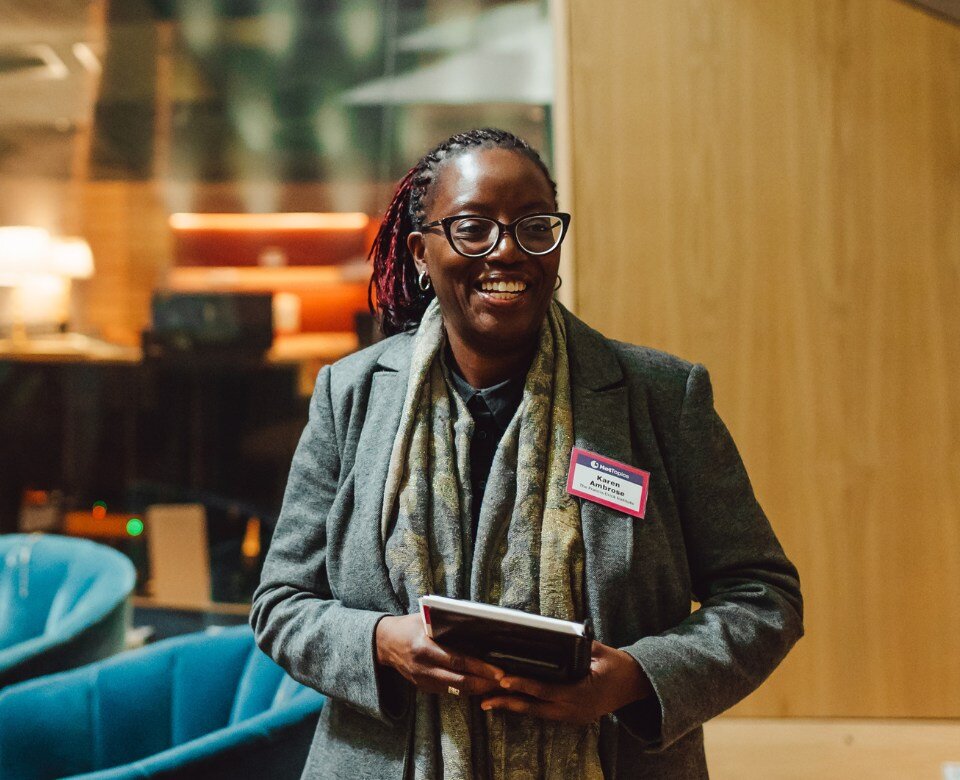
Leaders Profile: Karen Ambrose, Francis Crick Institute
Discover Karen Ambrose's journey as Chief Data Officer at the Francis Crick Institute and learn about her contributions to the Human Genome Project in this Leaders Profile.
As the Chief Data Officer at the Francis Crick Institute, Karen Ambrose has driven innovative data strategies and contributed to significant scientific endeavours like the Human Genome Project. She also led crucial adaptations during the COVID-19 pandemic.
In this exclusive CDO Leaders Profile, Ambrose shares insights into her career journey, the challenges and triumphs of managing data in cutting-edge research, and her advocacy for diversity and inclusion within the scientific community.
Karen Ambrose: the path to data leadership
- Starting a career journey in data science and bioinformatics
- Groundbreaking work at the Sanger Institute
- Leadership at the Francis Crick Institute
- Responding to the Covid-19 pandemic
- Advocacy and community engagement
Watch the full CDO Leaders Profile interview with Karen Ambrose here:
Starting a career journey in data science and bioinformatics
Ambrose’s fascination with science began early, inspired by the investigative nature of the TV show Quincy M.E, which she argued showcased the impact of scientific applications in solving real-world problems.
This curiosity led her to pursue an undergraduate degree in biochemistry. However, it was the emerging field of bioinformatics that truly captivated her interest. Recognising the potential to blend her love for science and computing, Ambrose embarked on a master’s degree in bioinformatics, a decision that set the course for her future career.
“Bioinformatics was a new sector in terms of science and I thought actually I quite like IT, it's quite like computing that side of things and that would be a nice way to bring those two things together.”
Groundbreaking work at the Sanger Institute
After completing her master’s, Ambrose joined the Wellcome Sanger Institute, a pivotal move that placed her at the heart of one of the most significant scientific endeavours of the time—the Human Genome Project.
“Being able to pivot in that industry, so going in as a programmer and sort of seeing, okay, I can potentially provide the glue between the data and the programming side and sort of develop database skills in that area.”
As part of the team that sequenced a third of the human genome, Ambrose was instrumental in developing data platforms and managing the vast datasets generated. Her contributions were acknowledged in the seminal Nature publication on the project, highlighting the increasing importance of data management and scientific computing in modern research.
Leadership at the Francis Crick Institute
At the Francis Crick Institute, Ambrose has continued to build on her extensive experience, focusing on managing the institute’s heterogeneous data and developing comprehensive data strategies.
Her role involves not just overseeing data volume but also enhancing data literacy across research groups, ensuring that data management is integrated from the start of projects rather than as an afterthought.
“Making sure that they understand how we manage data and what the issues are that we need to deal with so that they're thinking about their data management from the start as opposed to the end of the project. So changing that data culture to some degree.”
Over the years, Ambrose has contributed to a variety of publications while working at the Francis Crick Institute, with journal articles and literature views ranging from “AZD1222-induced neutralising antibody activity against SARS-CoV-2 Delta VOC” to “Strong peak immunogenicity but rapid antibody waning following third vaccine dose in older residents of care homes.”
Responding to the COVID-19 pandemic
One of Ambrose’s proudest moments at the Crick was during the COVID-19 pandemic. When the lockdown halted much of the ongoing research, the institute pivoted to become a COVID testing facility for the North London Trust.
“During COVID, everybody was locked down. So a lot of that research and that lab work couldn't continue—it was paused for that period.”
Ambrose and her team played a crucial role in establishing the data pipeline that managed sample processing and results reporting, enabling medical staff to determine their work status and helping to curb the virus’s spread. This project shone a light on her ability to adapt and innovate under pressure, significantly contributing to the broader public health effort.
“That's probably one of my proudest moments being part of that group that came together—it was quite inspirational, I think, for a lot of people.”
With the pandemic disrupting the order of work at The Crick, Ambrose and her team had no choice but to continue their work online. Luckily, they came prepared with an array of technology services and platforms that would allow them to tap into their on-premise services.
“It was more about looking for other opportunities or things that we could take, other parts of the work that we could take and do online. For us as technologists, that's part of the course, right? But for scientists, it's kind of a step away from what they normally would be used to doing.”
Advocacy and community engagement
Beyond her technical responsibilities, Ambrose is deeply committed to advocating for diversity and inclusion.
She serves as a representative on the Staff Forum and chairs PRISM, the Crick’s Black, Asian and Ethnic Minority Network. In her PRISM role, Ambrose ensures that issues related to race and ethnicity are addressed at the highest organisational levels, working to create an equitable environment for all employees.
Under her leadership, PRISM has organised numerous events, including the highly successful 'Bring Your Culture to Work Day,' and continues to foster a sense of community and support within the institute.
Quick fire questions 🔥
Dream job growing up?
I was interested in two areas, Science and technical drawing or CDT (Craft, Design and Technology), so I was also interested in being an Architect.
What keeps you up at night?
I wouldn’t say it keeps me up but I am very keen to progress equity in data and the development of local scientific data resources around the world, observing the requirements of governance and the need for collaboration.
What excites you about the next 12 months?
The increased role that data is playing in everyday life and the potential insights that can be captured to support and develop new technologies and discoveries.
What do you do outside of work?
I like to go out walking and I have a keen interest in Lego building sets.
Best advice you’ve ever received?
As a Manager, your team member’s problems are your problems, this still makes me chuckle, it is very true.
About Leaders Profiles:
The Leaders Profiles series offers exclusive insights and strategies from the industry’s top executives. As the ultimate hub for leadership excellence, we connect and inspire today’s top C-suite professionals—CIOs, CISOs, CFOs, CDOs, CMOs and CXOs—through in-depth interviews, quick video segments and strategic deep dives. Whether it's through Leaders Profiles or Leader’s Corner, our goal is to equip you with actionable insights and innovative strategies, directly from the minds shaping the future of business. Explore more on leadership trends and strategies at our Leaders Profiles hub.
RELATED ARTICLES
Join the community
To join the HotTopics Community and gain access to our exclusive content, events and networking opportunities simply fill in the form below.
